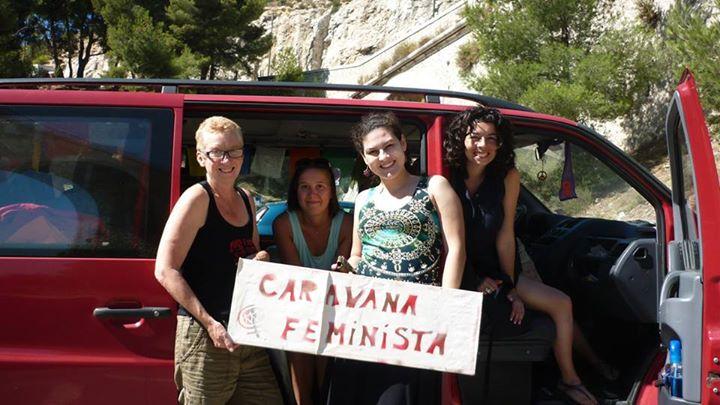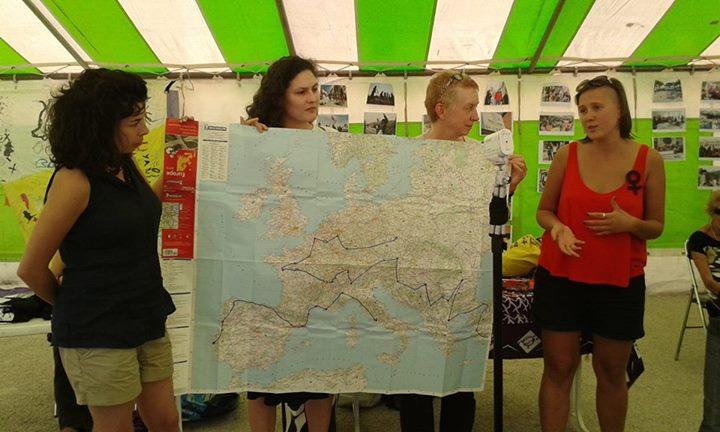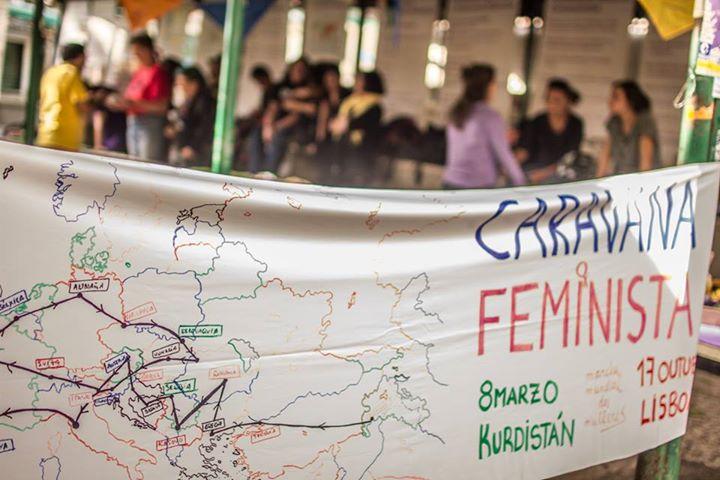Launched last March in Nusaybin, Turkish Kurdistan, the World March of Women Feminist Caravan across Europe will end on 17 October 2015 in Lisbon, Portugal, on the International Day for the Eradication of Poverty and the official closing of the 4th international action of the World March of Women. AWID spoke with activist Clara Carbunar, who is part of the World March of Women (WMW) France, the European coordination of WMW and organizing member of the European Caravan, to learn more.

AWID: Who initiated the European Caravan and why?
Clara Carbunar (CC): The WMW Network of Young Feminists in Europe[1] initiated the action as part of the 4th international action of the WMW, which involves regional actions to strengthen grassroots feminism in each continent and highlight diverse forms of women’s resistance and struggles. In particular, we wanted to strengthen ties with women in Eastern Europe, who are less well-organized in the march, with a caravan through the different countries and movements, to facilitate collective feminist organizing across the continent.
AWID: What are the objectives of the caravan?
CC: The main idea of the caravan was a reminder that all over the continent women are engaged in diverse struggles – although we hear very little about them – and to encourage one another as feminists in these struggles. The caravan comes at a difficult time for struggles in Europe, in particular with significant feminist backlash and isolation, especially for anti-capitalists who call into question the system as a whole. It was thus about building bridges across movements, documenting the current realities of women, and passing them on, in particular within the feminist movement.
The caravan also sought to give feminists the opportunity to work together and organize joint events at the local level. It thus provided a pretext for organizing events while allowing local feminists to decide how these would take place and their duration.
Another objective of the caravan was to build a community of feminists, whose community life presented an alternative to capitalist individualism. The caravan team was made up of some fifteen women of different nationalities, which varied depending on meetings along the way and those who joined for a specific time. It was also a space for activists joining this community to try and experiment with alternative lifestyles.

AWID: How were the caravan itinerary and activities decided upon?
CC: The general route of the caravan was developed based on the needs and demands of WMW at the national level. Local coordination groups with which we had already worked in the past were then contacted to ask their needs. The route of the caravan was then determined with dates and cities. At each stop, the type of caravan reception could vary from one night to five days of events, based on a needs analysis by local feminists in terms of duration and type of event. These events could either focus on the local, national or international level. They could take the form of demonstrations, conferences, discussions, visits to sites of struggles, cultural events, or practical workshops for feminist self-training, including workshops on self-defence and the theatre of the oppressed.
AWID: Could you tell us about the dynamics at the local, regional and international level?
CC: Audiences were very large but the events were primarily organized by local feminists. The role of the caravan team was about learning, understanding and sharing the struggles of these women. The arrival of the caravan made up of feminists from different countries helped to bring political strength to local feminists. Even in France, where you would think it more common to find diverse feminists, the caravan inspired a feminist dynamic in cities where grassroots feminist organizations do not exist. This was especially the case in the Balkans. In Belgrade, Serbia, for example, a group of lesbians decided to organize the Lesbian Spring, which included a public lesbian march in alliance with feminists. It was a first in Balkan history. They managed to bring in lesbians from other countries in the region, in a very difficult climate of violence against them. They made use of international support, which the caravan could bring, to draw on their own strengths to realize an unprecedented, symbolic and extremely moving event. This clearly shows how the global can serve to support and act as a vector for feminist solidarity.
AWID: How does the European caravan address the general themes of the WMW at the international level and what is the common symbol of this 4th international action?
CC: The World March of Women (WMW) works around four major cross-cutting themes: violence, peace and demilitarization, economic empowerment, and the issue of common goods/public goods. The European caravan connected with a number of different struggles related to each theme along the way. On demilitarization for example, we connected with a women’s movement from Turkish Kurdistan, visited the former Mauthausen concentration camp in Austria where women are fighting for the recognition of the forced prostitution of the women in the camp, and visited Srebrenica, in Bosnia and Herzegovina, 20 years after the genocide committed by Serbian military forces of Bosnia. Exiled women in Western Europe also shared their war experiences with us.
Seeds were chosen as the common symbol for this 4th international action of WMW in reference to the struggles of women for food sovereignty. As part of the caravan, there have been seed exchanges in public spaces to symbolize resources, land, water, food production and consumption, and related gender issues. Meetings with peasant women were also organized and many local groups took up the theme in their activities.
AWID: Could you tell us more about the feminist camp organized in Poland?
CC: In August, an international feminist camp was held in Wojkowice, Poland, bringing together some 40 feminists from around the world for a week. The camp responded to the need in Poland to create a space to connect to women’s movements in other countries, with the support of the WMW, as there is no official national feminist network in the country, and anti-capitalist women are a minority in relation to liberal feminists in Poland. One of the aims was to identify new popular movements in the post-communist world, following 25 years of transition, thus also connecting with women from Eastern Europe and supporting their mobilizations.

AWID: What have been the challenges you’ve faced?
CC: There are many challenges related to communication around the caravan, which we planned to be very regular in the beginning but this wasn’t possible due to lack of human resources. The caravan did not receive public subsidies, our funding requests were refused, and we had to deal with a very limited budget made up of private funds. We managed to raise 12,000 euros through crowd funding, which is very little for such a project, in particular when we know that our activists, especially those from countries that are less affluent than Europe, find themselves in extremely difficult economic situations. Another challenge we have faced is the European visa and border system, which complicates the movement of our activists.
AWID: What are the next steps?
CC: A caravan closing event will take place in Lisbon, Portugal on 15-17 October 2015. We hope to have a significant feminist presence from around the world. Thereafter, we will see how to share what the caravan observed in terms of little known women’s struggles, based on the documentation of struggles carried out during the journey. We would like to organize an exhibition and eventually produce a publication but that strongly depends on the human and financial resources available.
